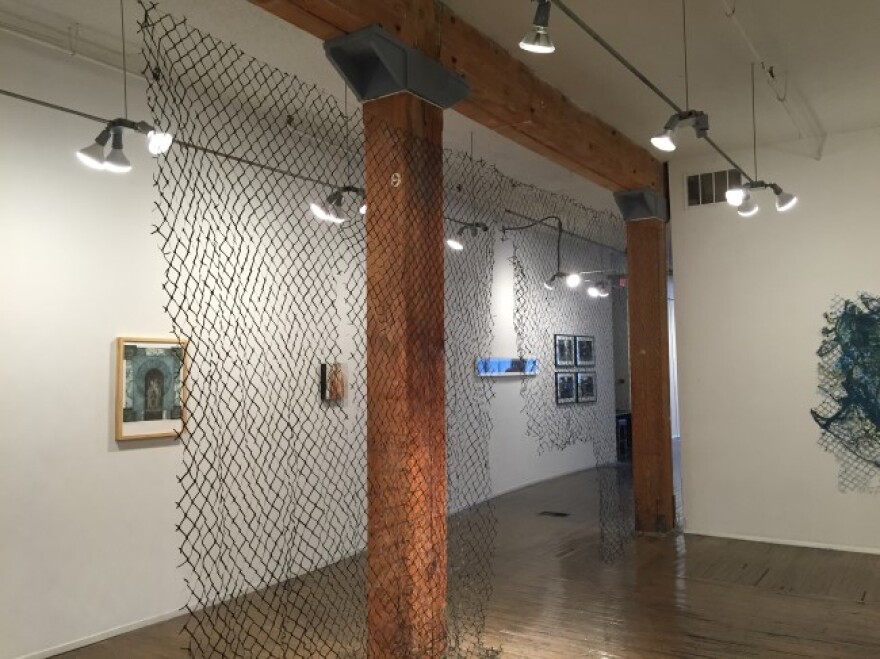When Fidencio Martinez-Perez was 7 years old, a smuggler brought him, his mother and his three brothers across the Mexican border.
Now he makes art in which the roads, rivers and boundary-markers of the United States resemble the blood vessels of human figures. His main material is simple, but significant.
Martinez-Perez starts with gas station fold-out maps. Then he begins a process as painstaking as the immigrant’s journey, spending months bent over a map with an X-Acto knife, carving away the white spaces that represent land until only the red, black and blue lines denoting roads and rivers remain.
The resulting sheets of cut-up paper are as fragile as doilies but freighted with meaning. Martinez-Perez then uses them to create installations that tell stories and, at the Kansas City Artists Coalition, a wall-sized curtain out of cut-up paper that looks like a chain-link fence.

“It’s so fragile it almost looks like a net, even though it’s supposed to be a fence,” he says.
“They’re both something that holds something or keeps someone from crossing to another spot. It had to be made out of paper because it had to be fragile. I want people to realize borders, regardless of how much money you might spend, through the human connection inevitably they’re going to be broken down.”
Martinez-Perez thinks of maps as individual narratives.

“I’m thinking of a figure having to traverse through a landscape made up of many experiences and histories,” says Martinez-Perez, who is completing an MFA at the University of Iowa and says Kansas City is on a list of potential cities where he might live after school.
He says maps are his way of documenting what’s often not documented.
His map collages evolved from paintings in which he would incorporate tattoo-like imagery, family photographs, newspaper clippings and images from money and birth certificates.
When he wasn’t happy with a piece, he’d cut it up. The painstaking nature of the work itself became significant.
“Why is cutting paper a skill,” he asks, “but someone who works in a restaurant, field, or garden is unskilled?”
Covering much of the gallery’s east wall is a collage depicting two children crossing a body of water. It’s inspired by his mother’s answers to his questions about their journey across the border.

“I would ask her, do you remember the routes? Her answer was always no. Because of the nature of the journey, you have to let go of the freedom and privilege of knowing basic information about what you’re getting yourself into.”
Their pilgrimage took them to North Carolina, where Martinez-Perez’s father was working and waiting. Martinez-Perez remembers childhood visits from his mother’s friend Juana, who was working in the United States and had eventually made enough money to pay a smuggler to bring her sons, who were about the same age he was when he made the crossing.

“She would tell my mom the updated news and locations of her two boys. Every week we would hear of how her kids are getting closer and closer to the border. One day Juana received a phone call: One had died and the other was insane and would never be the same.”
About the same time as Martinez-Perez was interviewing his mother about her experiences, U.S. news outlets began reporting about unaccompanied children coming over the border.
“The vocabulary that was used to describe those children was very bizarre: ‘the surge,’ ‘a wave,’” he says. “I knew that I had to start using the oceans of maps that I had been cutting.”
The fact that “hordes” of immigrants on the other side of the world are now drowning in faraway oceans is not lost on Martinez-Perez.
“Immigration not a Mexican or American or Latin-American issue – it’s a global issue,” he says.
Martinez-Perez's installation is one of three up for a few more days at the Kansas City Artists Coalition's galleries.
In the Mallin Gallery are Kansas City photographer Angie Jennings’ street photographs from China, which explore what Jennings describes as that country's "ever changing face." And downstairs in the Coalition's Underground Gallery, Kristin Powers Nowlin's black-and-white woodblock prints respond to cringe-inducing travel brochures and ads from the 1930s, romanticizing Southern culture.
All three exhibitions directly, and movingly, confront topics in headlines today.
They're up until the closing reception on Thursday, 6-8:30 p.m. at the Kansas City Artists Coalition, 201 Wyandotte Street, Kansas City, Mo., 64105, 816-421-5222.





